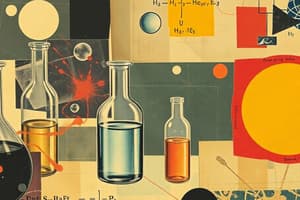Podcast
Questions and Answers
What are specific reagents used for in confirmatory experiments?
What are specific reagents used for in confirmatory experiments?
Which cations belong to Group II A?
Which cations belong to Group II A?
In distinctive experiences, what do the various reagents form with the ions of one group?
In distinctive experiences, what do the various reagents form with the ions of one group?
Which reagent is used for the detection of group I cations from basic radicals?
Which reagent is used for the detection of group I cations from basic radicals?
Signup and view all the answers
What is the common trait of group I cations when they precipitate in the form of hydroxides?
What is the common trait of group I cations when they precipitate in the form of hydroxides?
Signup and view all the answers
Why do the chlorides of group I cations not dissolve in hydrochloric acid?
Why do the chlorides of group I cations not dissolve in hydrochloric acid?
Signup and view all the answers
In the detection of group I cations, which compound is responsible for the formation of insoluble sulfides in the alkaline medium?
In the detection of group I cations, which compound is responsible for the formation of insoluble sulfides in the alkaline medium?
Signup and view all the answers
Which reagents are used as group I cation detectors in the given text?
Which reagents are used as group I cation detectors in the given text?
Signup and view all the answers
What are the common traits of the group I cations mentioned in the text?
What are the common traits of the group I cations mentioned in the text?
Signup and view all the answers
What happens when the group I cations' chlorides are treated with dilute hydrochloric acid?
What happens when the group I cations' chlorides are treated with dilute hydrochloric acid?
Signup and view all the answers




